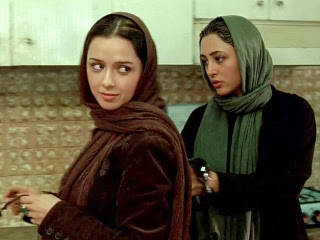One of my favorite film genres doesn't even have a name, but
we can call it the "country weekend" genre. In such films, family members
or friends of long standing go on a short vacation together, share some meals,
wine, and conversation, along with perhaps some shocking revelation or illicit
encounter, and return home, their lives changed in ways they never could have
anticipated.
The classics in the genre include Betrand Tavernier's A Sunday in the Country, Mikhail Mikhalkov's
Unfinished Piece for Mechanical Piano,
Claude Sautet's Paul, Vincent, Francois
and the Others, and Renoir's seminal Rules
of the Game. American attempts would include The Big Chill and The Return
of the Secaucus Seven, and Kenneth Bragnaugh's Peter's Friends might also qualify, though I haven't seen it.
Iranian director Asghar Farhadi explores these themes in About Elly, during which three married
couples make their way to the Caspian Sea from Tehran for a holiday weekend.
The film starts out with a flurry of activity as the group,
traveling in several vehicles, stops for a picnic, and it remains confusing as
they arrive at the resort only to find that due to a reservation mix-up, they must accept accommodations in a spacious
but seriously rundown seaside villa rather than a more comfortable and secure unit.
Several of the women are virtually indistinguishable to the
foreign eye, and it took me quite a while to sort everyone out, but it eventually
becomes clear that along with three married couples and several children,
another woman has been invited. This is Elly, the kindergarten teacher of Sepideh's
daughter. Sepideh is eager to introduce Elly to Ahmad, a recently-divorced friend
who's also been invited.
And therein lies the crux of the drama. To circumvent Iranian legal restrictions on unmarried couples traveling together, Sepideh tells the
proprietor of the resort that Elly and Ahmad are newly-weds. As the day progresses,
Elly and Ahmad become the butt of numerous wisecracks and knowing smirks and glances.
The married couples think this is all in good fun. (Of course, the men will be sleeping in one room, the women in another.) And Ahmad, who finds Elly appealing, is also quick to join
in the humor, but Elly finds such over-familiarity embarrassing.
As the group tidies up the villa and prepares the
evening meal, there's plenty of dancing and raillery, and even a lively game of charades, though tensions are
building below the surface. Why did Sepideh invite this woman, if she's going
to be so shy? And why did Sepideh do such a bad job of booking the reservation?
Shohreh is not happy about being so close to the water,
which her children find irresistible: They'll have to be watched continually.
One of the vehicles gets stuck in the sand. And to top it all off, the next morning
Elly decides she wants to go back to Tehran. Sepideh insists that she stay.
By this time, in the midst of all the swimming, the meals, and
the volleyball, several marital spats have developed, and the ugly patriarchic underpinnings
of Iranian culture have begun to strip the weekend of its remaining vestiges of fun.
And then, Elly disappears.
I don't mean to give away the second half of the film, but
Sepideh is eventually forced to admit she knows more about this mysterious Elly
than she's let on. The police, the owners
of the resort, and a few new characters become involved in a quest to determine
what happened to Elly, and who she really is. A good deal of tension develops and recriminations start flying in every direction before things finally get sorted out. Along the way director Farhedi raises a host of troubling questions about honor, lying, and social solidarity.
Unfortunately, they're the kind of questions we can't discuss without
giving away too much of the plot.
About Elly makes a good companion piece to Farhedi's subsequent film, A Separation, which deservedly won the 2012 Oscar for best foreign film. It's equally intricate, well-acted, and unpredictable, but slightly less brutal.
About Elly makes a good companion piece to Farhedi's subsequent film, A Separation, which deservedly won the 2012 Oscar for best foreign film. It's equally intricate, well-acted, and unpredictable, but slightly less brutal.









No comments:
Post a Comment